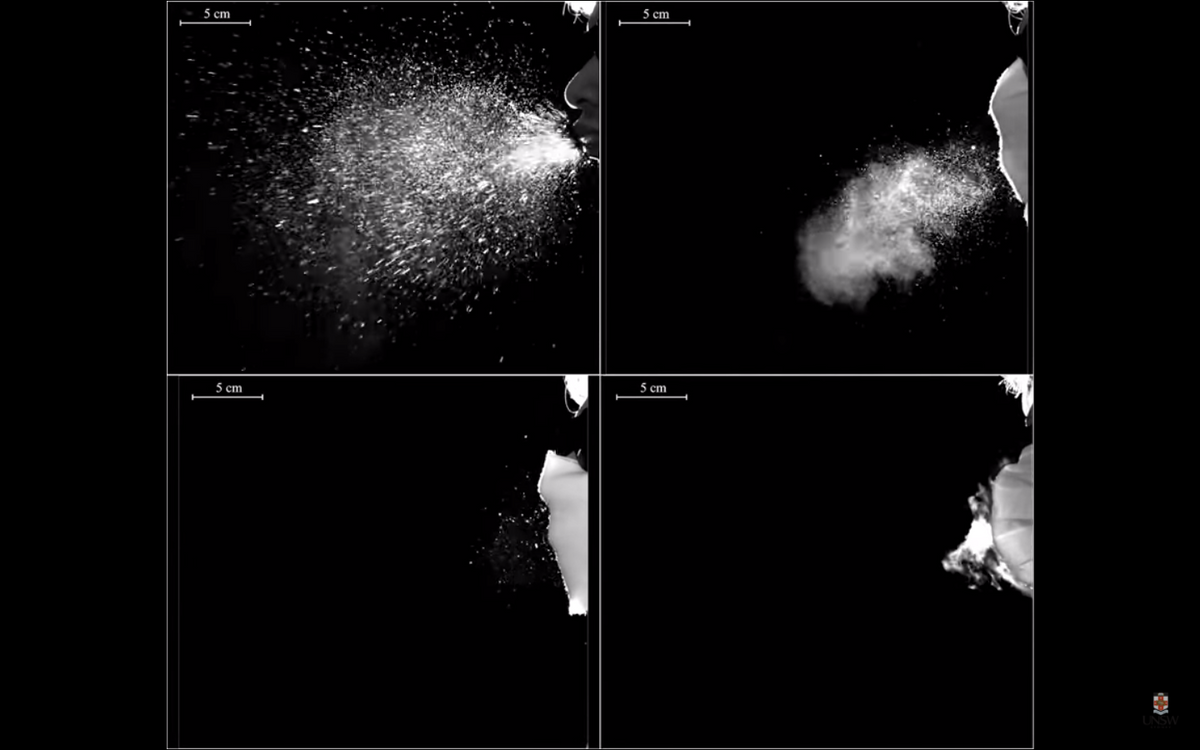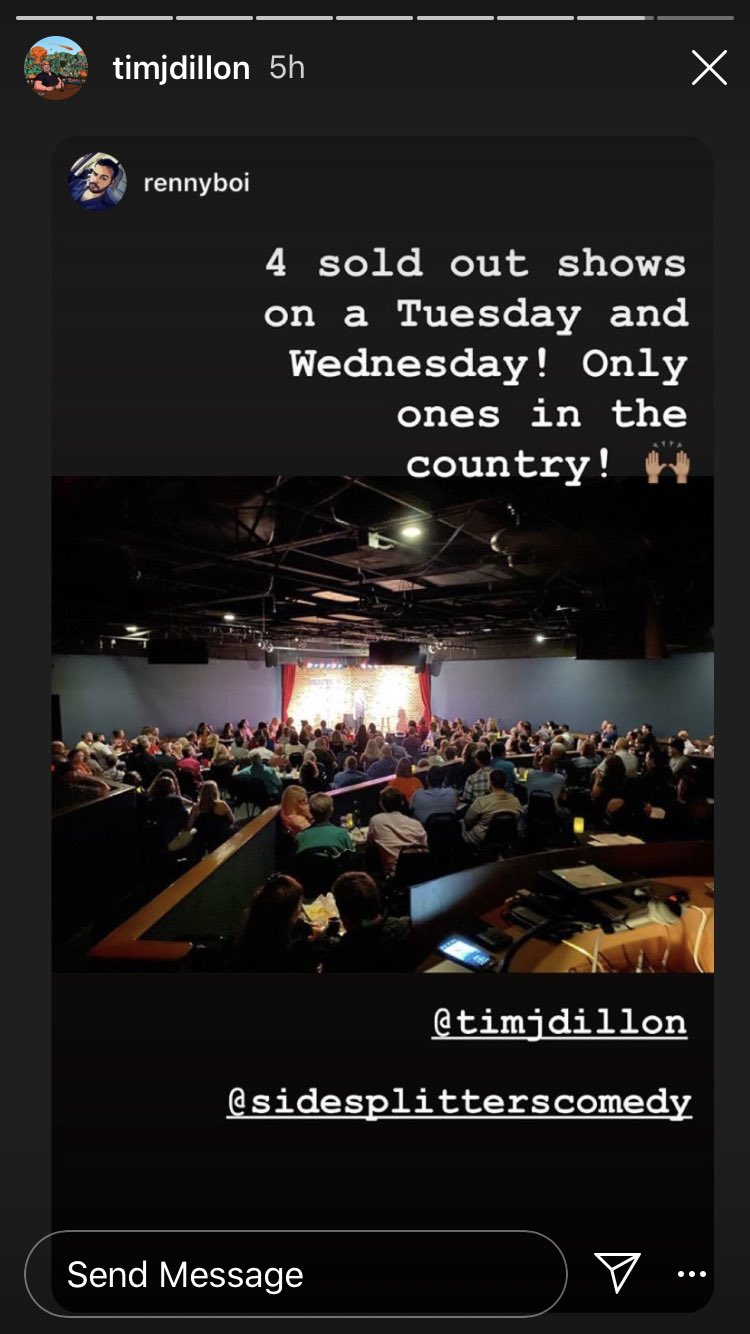Comedy Clubs Are Fucking Us All Over
If they're going to stay open, they should at least get serious about masking.

If you can, please support this newsletter by upgrading your subscription for $6/month.
Last week the comedian Tim Dillon headlined a run of shows at the Tampa comedy club Side Splitters. Florida Governor Ron DeSantis recently lifted the state’s Covid-19 restrictions, allowing clubs like Side Splitters to operate without any safety protocols. One of Dillon’s openers, Chad Zumock, wrote on Twitter that the shows were “sold out.” Images posted on social media captured a packed showroom with audience members seated close together, few wearing masks. In a tweet quoting Zumock, Side Splitters said, “We have something special going on here in Tampa.”

We have something special going on here in Tampa https://t.co/Y669aMHJcSOctober 21, 2020
In June, Hollywood’s trade unions published a detailed set of safety guidelines for the industry to follow as it resumed production. Standup comedy has no such unions, leaving reopened comedy clubs to follow a patchwork of varyingly strict guidelines set by each state. In Florida, no masking or distancing is required in indoor venues. In Connecticut, where distancing and reduced capacity are the rule, everyone inside an event space must wear a mask—employees, patrons, and even performers. Ohio is a bit more lenient, letting performers take off the mask when they’re onstage. In Texas, as in many other states, masking is required only when individuals cannot maintain six feet of distance from people outside their social bubbles. The state has also allowed many counties to opt out of masking restrictions, while others have declined to enforce them.
In the absence of clear, consistent guidance from federal authorities or industry leaders, comedy clubs have replicated the broader national approach to reopening: every man for himself. Each state, city, and even club approaches the threat of Covid-19 with varying seriousness. Rare is the venue that goes beyond the minimum safety protocols required by law; rarer is any common understanding of the virus. In New York City, once the pandemic’s epicenter, a campaign to reopen clubs was championed by a state senator who suggested indoor comedy is safer than indoor dining because people don’t make as much noise: “At a restaurant, people sitting around the table are talking to each other the whole time, whereas at a comedy club, they’re generally not doing that. They’re staring at the performer,” he said, per Vulture. Presumably nobody told him they make money from food and beverage sales, or that audiences ideally laugh. One club owner involved in the campaign, Al Martin of Manhattan’s Broadway Comedy Club, believes comedy audiences are young people who either don’t get sick or recover quickly, and that if airlines can operate despite the risks of asymptomatic spread, then so should clubs. He is currently suing Bill de Blasio and Andrew Cuomo to lift the city’s restrictions on live entertainment.
These knowledge gaps are perhaps most apparent in the industrywide apathy toward masking. With rare exceptions, clubs do not require patrons to wear masks while they are seated. Some may require masking when patrons are seated and not actively eating or drinking—typically in accordance with state guidelines for indoor dining—but a quick scan of clubs’ social media shows minimal enforcement across the board. Walk into any comedy club across the country and you are likely to be greeted by a maskless crowd.
The rules governing indoor performing arts venues may vary by locality, but the science does not: clubs with lax attitudes towards masking are playing with fire. “Clearly that's a dangerous situation for people to be in—indoors without wearing masks,” said Karen Jubanyik, an MD and Associate Professor at the Yale University School of Medicine. “A typical comedy club, with eating and drinking and people squished together and the comic speaking loudly and the other people speaking loudly, that just seems like a setup. No matter what state you're in, it seems like a set up for spread of the virus.”
Distancing mitigates but does not eliminate the risks, especially when alcohol enters the picture. “People, when they're drinking, they talk too loud,” Jubanyik cautioned. “They get too close to other people that they may not necessarily physically get as close to. Alcohol seems to be, because of its disinhibitory effect, a potential bad player.”
As for the common framing that “if indoor dining is okay, indoor comedy should be too”? It’s not just illogical; it downplays the real dangers of indoor dining. “We know that restaurants are one of those main sources for transmission now in public, because you have people not wearing masks for extended periods of time” said Brian Labus, an epidemiologist and Assistant Professor at the University of Nevada, Las Vegas. “If that’s what’s happening in the clubs, it’s going to be that same increased risk.”
Ellen Turner, an infectious diseases physician and faculty member at the Drexel University School of Medicine, went one step further. People “tend to not be in a typical restaurant for as long, probably, as if they're watching a show,” she said, meaning comedy clubs may pose a greater risk than restaurants. “Prolonged time indoors in a space without masks, when people are potentially releasing more viral particles by being louder or laughing or expressing themselves outwardly, may create more potential for spread.”
Turner suggested clubs keep audiences masked up until their food arrives, even if local guidelines don’t require them to. A simpler route, Jubanyik hypothesized, might be for clubs to skip the food and drink part altogether, instead operating more like movie theaters, with patrons masked the entire time. (This may require higher ticket prices to compensate.) At the very least, she said, “If there's no reason why you can't wear a mask, you should be wearing a mask.”
As Florida’s lifting of restrictions shows, some states simply don’t go far enough to protect their citizens. Comedy clubs need to seriously consider whether the public good requires them to pick up some slack. If they think they can compensate for lax masking policies with temperature checks (which don’t detect asymptomatic cases), surface disinfection (which doesn’t prevent person-to-person airborne transmission), and plexiglass barriers between stage and audience (which only captures so many of a performer’s particles, and make no dent on transmission within the audience), then they may need to take a closer look at how exactly the coronavirus works.
“The real problem with Covid, we found, is that there's so many asymptomatic people, especially the young people,” Jubanyik told me. Because they don’t know they’re sick, they go about their daily activities unaware that they’re spreading the virus. “They go to school, they go to basketball practice, they go to the library, they go to the mall and they go to McDonald's all in one day, spreading this everywhere.”
The Al Martins of the world have it backwards. Young, asymptomatic audiences don’t make clubs safe; they make clubs a public health risk. “If it was the old ladies who were asymptomatic, we wouldn't have to worry so much,” Jubanyik said. “The typical lady over 85 doesn't necessarily go that many places in one day. But it's our young people who are asymptomatic, who are going to 45 places, including things like comedy clubs, at the end of a day going to 40 other places… The people who go to comedy clubs are likely to not get sick on this themselves, but they’re more likely to spread it to a bunch of unsuspecting people.”
As I have made abundantly clear in this newsletter, I believe comedy clubs should not be open. It was obvious from the start that the people who return to them would be those least concerned about the virus. Reality has borne this out again and again: look no further than the pictures of grinning maskless audiences, or the comics who got Covid-19, recovered, and immediately went back on the road. This industry of freelancers and capitalists is not equipped to think about the long-term collective good.
Unfortunately I did not get my way. Clubs are open, and very likely circulating the virus throughout their communities. So long as this is the case, everyone with a stake in their future should insist on a tougher approach to safety. I suggest they begin by asking for distancing and universal masking—when not eating or drinking, if applicable—even where the law does not require these. If comics won’t make this demand, then their representatives should make it a condition for every booking. (But managers and agents are no less cynical!, you may respond. Yes, and they make more money from TV and film gigs than standup, so they’ll probably want their clients to survive the road.) And in cities where live entertainment has not yet resumed, like Los Angeles and New York City, clubs should preemptively lobby for the eventual reopening guidance to include strict masking and distancing protocols.
It’s very straightforward. The alternative is disease and death. They may never see the damage up close, but they’ll own it all the same.
Header image via UNSW/YouTube.


